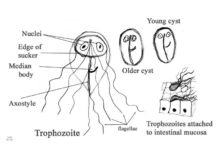Managing Idiopathic Epilepsy in Dogs
Idiopathic epilepsy affects young dogs between the ages of six months and six years. As the name implies, the cause of idiopathic epilepsy is unknown. It is a diagnosis of exclusion, meaning that other causes of seizures must be ruled out before making this diagnosis.
Fighting Cases of Heartworm in Dogs
Heartworms are horrible. No arguments there. Anyone who has ever known or had an infected dog knows how slowly but surely the parasites can sap the animal’s strength and vitality. Going through the treatment to kill the heartworm is no walk in the park either. The “cure” is quite capable of killing the dog in the process of trying to save its life. But some people just don’t like the idea of giving the dog the chemical preventatives that can keep the pooch safe from infestation. And some dogs are sensitive to the drugs, reacting to each dose with vomiting, diarrhea, and other symptoms.
Exocrine Pancreatic Insufficiency in Dogs
Kanis Fitzhugh, a member of the Almost Home organization, knew she had to rescue Pandy, an extremely thin and seemingly vicious four-year-old Dachshund. Pandy had been relinquished to a shelter in Orange County (California), who turned her over to Southern California Dachshund Rescue. Deemed people- and animal-aggressive, Pandy appeared to have been starved, and weighed just 13 pounds. Fitzhugh thought the dog deserved a break, and brought Pandy home in May 2007. During the first couple of weeks in her new home, Pandy managed to pull a chicken down from the counter and proceeded to eat the entire bird, including bones, plastic tray, and grocery bag, in less than the 10 minutes that Fitzhugh was out of the room. Pandy was rushed to the vet and emergency surgery was performed, as the bones had ruptured her stomach lining in three places. Luckily, she survived. Pandy's voracious appetite, large voluminous stools, and aggressive disposition were all caused by a medical condition called exocrine pancreatic insufficiency (EPI). With Fitzhugh's loving care, including enzyme supplements and a change of diet, Pandy stabilized. Within a year, Pandy had transformed into a beautiful, funny, 26-pound Dachshund who gets along great with all the human and animal members in the Fitzhugh household. Exocrine Pancreatic Insufficiency, or EPI, also referred to as Pancreatic Hypoplasia or Pancreatic Acinar Atrophy (PAA), is a disease of maldigestion and malabsorption, which when left untreated eventually leads to starvation. One of the major difficulties with this disease is in the prompt and accurate diagnosis. Astonishingly, visible symptoms may not appear until 80 to 95 percent of the pancreas has atrophied.
Hookworm in Dogs
Hookworm in dogs is a nasty parasite that can coexist with an adult dog for quite sometime, and spread. Recognizing the signs of hookworm infection is the best way to protect your dog, and other dogs too.
How Do Dogs Get Ringworm?
Dogs can get ringworm from other dogs or from humans or any other animal that has an active infection.
Symptoms of Heartworm
Heartworm is a deadly parasite spread by the bite of a mosquito. The symptoms of heartworm becoming increasingly severe as the damage progresses. This damage is not fully reversible making prevention or early treatment critical.
What To Do If Your Dog Has Worms
Deworming agents are present in any number of prescription and over-the-counter treatments for dogs and puppies. If your dog shows signs of a gastrointestinal worm infestation, there are all sorts of products available that are made exclusively to rid dogs of various types of worms. But there are also deworming agents included whether they are needed or not in many flea and tick treatments and in most heartworm preventive drugs; in fact, it's sometimes hard to find a minimalist flea treatment or heartworm preventive drug that does not contain dewormers. The question is, is this really necessary? Are intestinal parasites that much of an ongoing threat to most dogs and their owners?
New Treatment for Pituitary-Dependent Cushing’s Disease
A surgical procedure used on humans to remove brain tumors that cause Cushing’s disease is now becoming available to dogs, thanks to collaboration between a human neurosurgeon, a veterinary endocrinologist, and a veterinary surgeon in the Los Angeles area.Cushing’s disease (hyperadrenocorticism, or HAC) is an adrenal disorder common in middle-aged and older dogs, affecting an estimated 100,000 dogs per year in the U.S. It occurs when the body produces too much cortisol, causing increased appetite and thirst, skin problems, and muscle weakness. Cushing’s can also predispose dogs to other conditions such as diabetes, pancreatitis, and infections.
Treating Problematic Giardia Infections in Dogs
which resemble cartoonish eyeballs
Can Dogs Get Tetanus?
Fortunately, tetanus is relatively rare in dogs. Horses and humans are more susceptible to tetanus, while cats are highly resistant. Dogs fall somewhere in the middle of this spectrum but it does happen. As an emergency veterinarian, I have personally seen two cases of tetanus in dogs and read of several others.
Epileptic Dogs Can Live Normally
Don't despair if your dog has seizures or is diagnosed with epilepsy. Informed care and complementary methods can help these dogs live long, happy lives. Seizures can occur for a variety of reasons across the whole range of ages, and are the most common neurological disorder found in dogs. Making the diagnosis of canine epilepsy is a process of elimination.
Symptoms of Dog Hypothermia
Although hypothermia is usually a cold weather problem. Swimming in cold water, or wet and chill due to rainy weather can also cause hypothermia in dogs.



















